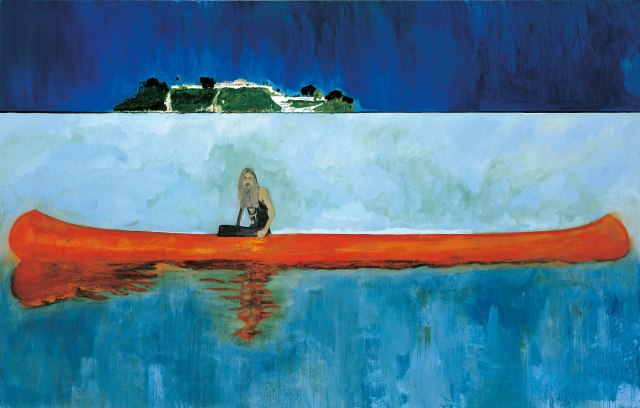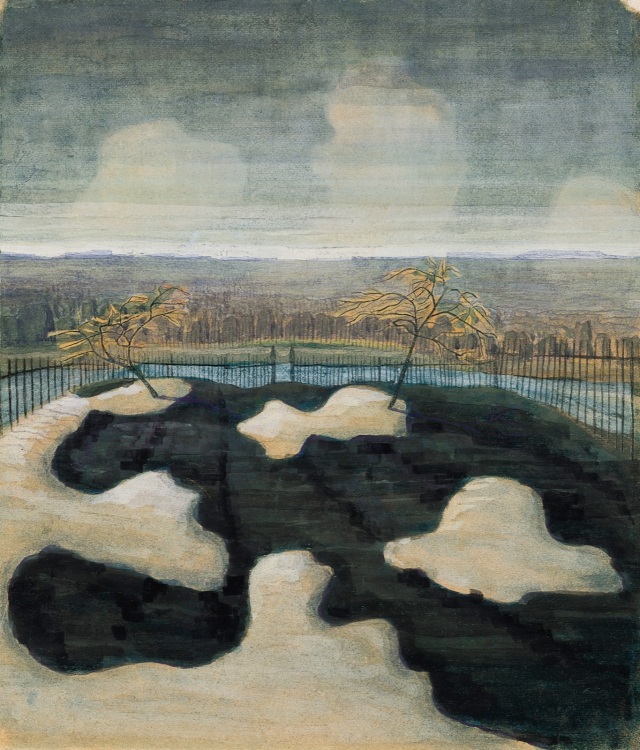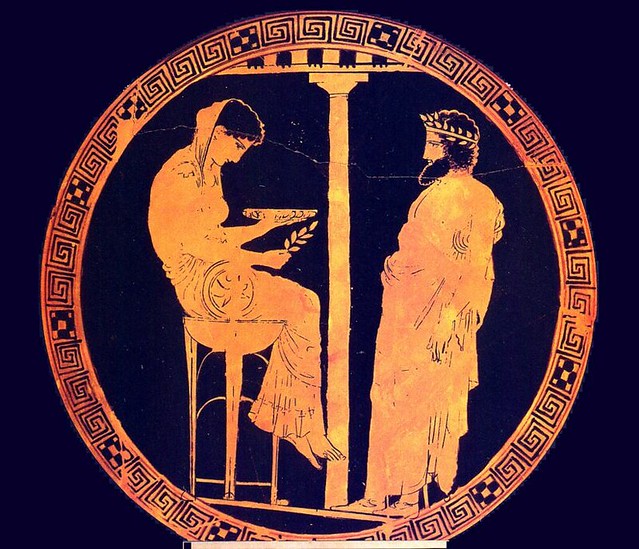I. “The ancient masters cultivated the
mysterious essence.
They were profound, subtle –
beyond our ability to comprehend.
For this reason we cannot know them,
but we can try to describe their
existence:
Cautious, as if crossing an icy river in
winter.
Vigilant, as if surrounded by unseen
dangers.
Reverent, as if receiving honoured
guests.
As malleable as ice when it begins to
melt,
as unspoiled as an uncarved block,
as receptive as a vast and open valley.”
Tao Te Ching (15), interpretive translation by Robert Brookes, Kindle edition
II. “Know the male, but hold to the female.
Imagine a river flowing through a
valley,
never departing from its original path.
Do this and you will return to a state of
innocence.
Perceive the bright, but hold to the
dark.
Like a river, let yourself flow with
virtue,
and set a faultless example for the
world.
Do this and you will return to a state of
perfection.
Be aware of honour, but hold to
humility.
Like a valley, let virtue fill you,
sufficient yet everlasting.
Do this and you will return to the state
of the uncarved block.
Just as when the uncarved block is
shaped it loses its simplicity,
when the wise person loses his
simplicity he is no longer wise.
Therefore it is best to stay on the
original path.”
Tao Te Ching (28), interpretive translation by Robert Brookes, Kindle edition
III. “Below the surface-stream, shallow and light,
Of what we say we feel—below the stream,
As light, of what we think we feel—there flows
With noiseless current strong, obscure and deep,
The central stream of what we feel indeed.”
Matthew Arnold

Peter Doig, “100 Years Ago”
Beyond all the roles we play every day, beneath the layers of culture, nationality, gender, and other accidental characteristics, lies our authenticity. As Edward Young wrote, we were born as authentic, original works of art, but sadly we so often die copies (quoted after Trilling). The root of the word “authenticity” says a lot about its challenging nature, as Trilling puts it:
“Authenteo: to have full power over; also, to commit a murder. Authentes: not only a master and a doer, but also a perpetrator, a murderer, even a self-murderer, a suicide. Forgetting how much violence there was in its creative will, how ruthless an act was required to assert autonomy in a culture schooled in duty and in obedience to peremptory and absolute law, and how extreme an exercise of personal will was needed to overcome the sentiment of non-being.”
To collide with social norms is a violent act. To act according to the dictates of internal space is the most difficult task we can face. What in Tao Te Ching was names the simplicity of an uncarved block, Hegel called a condition of baseness:
“For Hegel, in the progress of ‘spirit’, the individual consciousness will eventually move from this condition of sincerity to a condition of baseness, in which the individual becomes antagonistic to external societal powers and achieves a measure of autonomy.”

Joseph Mallord William Turner, “The Thames above Waterloo Bridge”
The word authenticity in its contemporary use comes from the philosophy of Heidegger, who used the word Eigentlichkeit, which was translated as authenticity into English. The German word eigentlich means really or truly, yet the stem of the word – eigen – means proper, own:
“So the word might be more literally translated as ‘ownedness’ …, or even ‘being one’s own’, implying the idea of owning up to and owning what one is and does.”
To own oneself and not to be owned by anyone lie at the root of authenticity. This is echoed in the famous quote from Hamlet, “This above all: to thine own self be true.” Being true to oneself is not the same as narcissism:
“…authenticity does not amount to egoism or self-absorption. On the contrary, the prevailing view seems to have been that, by turning inward and accessing the “true” self, one is simultaneously led towards a deeper engagement with the social world. This is why Taylor describes the trajectory of the project of authenticity as ‘inward and upward’”
As Jung frequently emphasized, only an individual can individuate; and not a group or a society. The evolution starts within an individual who opens to collective forces and faces a task of making them uniquely his or her own. Collectively, we are driven by individuals. For Heidegger, to be authentic meant to “take a stand” on who we are in every moment of our existence. He believed that as individuals we “fall” into society, a process which is inevitable and inescapable, though as a result we so often do not feel as authors of our own lives:
“To the extent that our lives are unowned or disowned, existence is inauthentic (uneigentlich), not our own (eigen). …
What conscience calls out to us is the fact that we are ‘guilty’ in the German sense of that word, which means that we have a debt (Schuld) and are responsible for ourselves. Conscience tells us that we are falling short of what we can be, and that we are obliged to take up the task of living with resoluteness and full engagement. Such resoluteness is seen clearly in the case of vocational commitments, where one has heard a calling and feels pulled toward pursuing that calling.”
In a strikingly similar fashion, in his “The Development of Personality,” Carl Jung spoke of vocation as hearing the inner voice, obeying one’s own law, “as if it were a daemon whispering … of new and wonderful paths.” The Jungian axiom is that to become authentic, to develop personality, one must succumb to the dictates of the inner voice:
“Just as the great personality acts upon society to liberate, to redeem, to transform, and to heal, so the birth of personality in oneself has a therapeutic effect. It is as if a river that had run to waste sluggish side-streams and marshes suddenly found its way back to its proper bed, or as if a stone lying on a germinating seed were lifted away so that the shoot could begin its natural growth.”
Collected Works of C.G. Jung, Volume 17: Development of Personality, Kindle edition, par. 317
In current discourse the term authenticity seems to have been replaced by empowerment. This article ridicules the trendiness of the buzzword and the phenomenon and my first reaction was to agree with the author. However, perhaps it showcases the same hunger that has been with humanity for millennia: to let our actions be dictated by inner impulses and to free ourselves from being judged by external norms that ultimately are not our own.

M.K. Ciurlionis, “Spring”
Sources:
Lionel Trilling, Sincerity and Authenticity, Kindle edition
Somogy Varga, Charles Guignon, “Authenticity,” http://plato.stanford.edu/entries/authenticity/












Wonderful composition Monika. To thine own self be true, one of my consistently favorite quotes. We are born to be ourselves. The paradox lies in the superimposed duality that attempts to restrict and punish individuality.
LikeLiked by 1 person
Thank you very much, Linda. It is a consistent message we from so many diverse sources but so few of us really listen.
LikeLiked by 1 person
Great post, Monika. To know thyself… that is key. And I love that you quoted the Tao and Hamlet in the same post. I’m inspired. If I ever get rich and retire, I’ll write “The Tao of Hamlet.” 😉
Cheers!
LikeLiked by 1 person
Perhaps someone beat you to it: http://www.mchblank.co.uk/page6/page143/page137/page137.html
I would definitely see Horatio as a tao master, not so sure about Hamlet, though his wisdom is profound.
Thank you for your thoughtful, Jeff.
LikeLike
Fie! A hit, a very palpable hit!
LikeLiked by 1 person
Love the Matt Arnold quote – great write !
LikeLiked by 1 person
Yes, and this is actually a complete poem – so short and so profound!
LikeLiked by 1 person
Outstanding, Monika !!!!
LikeLiked by 1 person
Incredible read. Very timely in numerous arenas.
LikeLiked by 2 people
Very happy to hear that. Thank you. I did realize it corresponded with the recent lunation only after I finished it.
LikeLike
Pingback: Psychological Vantage of the April Full Moon – Pyromancer Vulcan
Reblogged this on lampmagician.
LikeLike
I appreciate the way you collected and organized material from these various sources. Effective. Thought-provoking. And quieting.
LikeLiked by 1 person
Thank you – I really appreciate your taking the time to say that here.
LikeLike
“Forgetting how much violence there was in its creative will, how ruthless an act was required to assert autonomy in a culture schooled in duty and in obedience to peremptory and absolute law, and how extreme an exercise of personal will was needed to overcome the sentiment of non-being” – Love that quote by Trilling. It reminds me of this quote by Rilke,
“It is a tremendous act of violence to begin anything. I am not able to begin. I simply skip
what should be the beginng”
Words I often think upon in the morning before I leave the house, whilst waiting for the benignly violent jolt of coffee to kick in
LikeLiked by 2 people
Great juxtaposition of quotes – both very powerful. Thank you very much for sharing.
LikeLike
I must come back to this and read it later. I am a bit stunned. I have not been on line for a couple of days and i had to stop what I was doing to see if you had written a post Monika. around what I received in the Scorpio Full moon early a.m. meditation. A woman in a canoe! Gorgeous.!
I was an Egyptian young woman being gondoliered down the Nile in a punt. I received an initiation tattoo of The Edfu, Falcon Horus on my upper left arm. I confess I don’t know much re: Horus priesthood.
My ancient lineage is of Anubis.
The other initiation was from a Native American woman receiving large back tattoo of 8 spoked wheel, a.k.a I realised later! The medicine Wheel.
The beautiful Phoenix full moon has not arrived yet. I will read your post later. Thank-you!
LikeLiked by 1 person
Hello dear one,
Truly stunning. Thank you very much for checking my post and for sharing your extraordinary initiation experience. Nothing can be the same after something like this, I imagine.
Warmly,
Monika
LikeLike
Thanks Monika. I just thinking about Prince. So surely his Soul was poled away by the Gondolier. Of course he was authentic. I can relate to the Scorpio moon exactly on his Neptune in 12th. His set up very close to mine. …shivers…
He had all the talent. I can relate that he so often would have been overwhelmed as a vessel used by the large gods. Mars on the world point!
must look again into his set up.
Funny that people have been mentioning pearls to me the last week.
My favourite Prince song “Diamonds and Pearls”.
I feel that you maybe intuited these events with your imagery and choice of poem Monika.
LikeLiked by 1 person
I have been looking at his chart as well: http://www.vegaattractions.com/sitebuilder/images/prince-600×399.jpg
That Mars is very striking to me as well. I have a Sun conjunct his Sun, which I had not realized until recently. Another striking feature is MC on Regulus with Pluto. Since Regulus means “Little King” in Latin, he was indeed the Prince.
LikeLike
Yes I had registered Regulus M.C. Thank-you Monika. I was just about to look at his chart again, am reading David Tancredi’s site, A Fool’s Journey.
I am really feeling a small, shy, very intuitive,talented person who was the Gods’ vehicle. I am getting promptings that his name Prince is archetypical, as you say, writ large.
Surely the fact he was found enclosed in a cube is symbolic of Pluto.
The Scorpio full moon. The Phoenix. We will see a royal birth here somewhere on this planet.
I feel more emotional about this today than yesterday.
Thanks for the site info.It is a new 1 to me. You are very generous Monika, cheers.
LikeLiked by 2 people
That site I was on sorry, A fool’s Inclination.
Checked his chart reminded me his sun recently, time of eclipse? transitted by Psyche. i don’t know much about it, but have noticed it being significant similar in terms of our wounding. Major player in Robin Williams death, transitted by Venus on that day.
His Saturn on Ras al Hague, the Visionary.
Of course the March 8 solar eclipse 18* Pisces a major player here.
LikeLiked by 1 person
The full moon set off a close Yod with his Mars Aries point, Mercury in Gemini, perhaps lung problems. He has Psyche rising near ascendant 10* Scorpio, conjunct Neptune.
LikeLiked by 1 person
Thank you for sharing all your astrological insights here – all extremely valid, of course as far as I can tell… He was extremely unique and hugely talented – a true vehicle of the gods, as you say.
LikeLike
Pingback: Sunday Surfing and a Follow-Up on Mars Retrograde | Neptune and the Oak